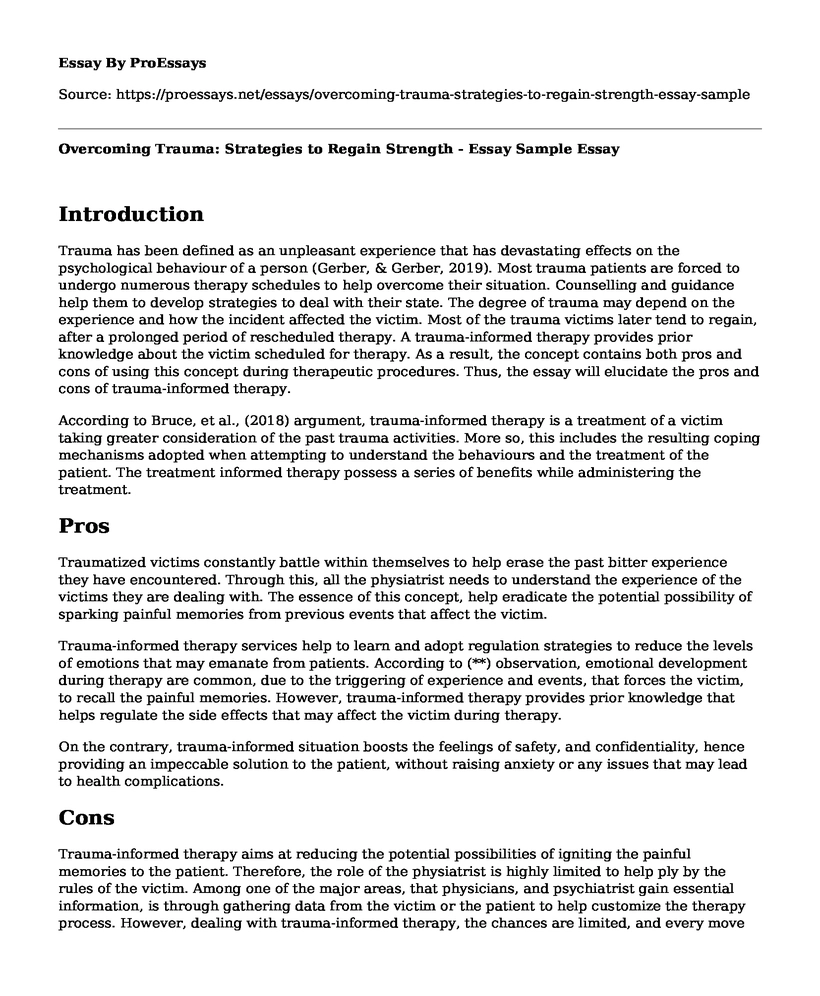Introduction
Trauma has been defined as an unpleasant experience that has devastating effects on the psychological behaviour of a person (Gerber, & Gerber, 2019). Most trauma patients are forced to undergo numerous therapy schedules to help overcome their situation. Counselling and guidance help them to develop strategies to deal with their state. The degree of trauma may depend on the experience and how the incident affected the victim. Most of the trauma victims later tend to regain, after a prolonged period of rescheduled therapy. A trauma-informed therapy provides prior knowledge about the victim scheduled for therapy. As a result, the concept contains both pros and cons of using this concept during therapeutic procedures. Thus, the essay will elucidate the pros and cons of trauma-informed therapy.
According to Bruce, et al., (2018) argument, trauma-informed therapy is a treatment of a victim taking greater consideration of the past trauma activities. More so, this includes the resulting coping mechanisms adopted when attempting to understand the behaviours and the treatment of the patient. The treatment informed therapy possess a series of benefits while administering the treatment.
Pros
Traumatized victims constantly battle within themselves to help erase the past bitter experience they have encountered. Through this, all the physiatrist needs to understand the experience of the victims they are dealing with. The essence of this concept, help eradicate the potential possibility of sparking painful memories from previous events that affect the victim.
Trauma-informed therapy services help to learn and adopt regulation strategies to reduce the levels of emotions that may emanate from patients. According to (**) observation, emotional development during therapy are common, due to the triggering of experience and events, that forces the victim, to recall the painful memories. However, trauma-informed therapy provides prior knowledge that helps regulate the side effects that may affect the victim during therapy.
On the contrary, trauma-informed situation boosts the feelings of safety, and confidentiality, hence providing an impeccable solution to the patient, without raising anxiety or any issues that may lead to health complications.
Cons
Trauma-informed therapy aims at reducing the potential possibilities of igniting the painful memories to the patient. Therefore, the role of the physiatrist is highly limited to help ply by the rules of the victim. Among one of the major areas, that physicians, and psychiatrist gain essential information, is through gathering data from the victim or the patient to help customize the therapy process. However, dealing with trauma-informed therapy, the chances are limited, and every move conducted to get essential information is highly scrutinized. Therefore, critical data is omitted out deliberately to avid igniting painful memories. Through this, the patient receives substantial treatment.
Trauma-informed therapy constitutes to a higher degree of possibilities to offer substantial services to the patient. Most of the victims have painful memories that are sparked by a slight action of the event. For physicians with prior knowledge about the patient's situation, are forced to abide by the patient's terms, even if they are violating the code of conduct or slowing operations within the facility (Goldstein, et al., 2018). Through this, operating in a trauma-informed incident, patients or victims may choose to defy the protocol, hence forcing the physicians to waste a lot of precious time trying to lure the patient into accepting their terms.
Conclusion
In conclusion, trauma-informed therapy might pose a series of benefits and downsides to both the patient and the therapist. Operating in an informed environment provides a vast consideration of the patient's condition. However, the downside of this approach limits the potential possibility of providing sufficient data, and support to the patient, due to the fear of sparking painful memories.
References
Bruce, M. M., Kassam-Adams, N., Rogers, M., Anderson, K. M., Sluys, K. P., & Richmond, T. S. (2018). Trauma Providers' Knowledge, Views and Practice of Trauma-Informed Care. Journal of trauma nursing: the official journal of the Society of Trauma Nurses, 25(2), 131.doi: 10.1097/JTN.0000000000000356
Gerber, M. R., & Gerber, E. B. (2019). An Introduction to Trauma and Health. In Trauma-Informed Healthcare Approaches (pp. 3-23). Springer, Cham.doi.10.1007/978-3-030-04342-1_1
Goldstein, E., Murray-Garcia, J., Sciolla, A. F., & Topitzes, J. (2018). Medical students' perspectives on trauma-informed care training. The Permanente Journal, 22.doi: 10.7812/TPP/17-126
Cite this page
Overcoming Trauma: Strategies to Regain Strength - Essay Sample. (2023, May 22). Retrieved from https://proessays.net/essays/overcoming-trauma-strategies-to-regain-strength-essay-sample
If you are the original author of this essay and no longer wish to have it published on the ProEssays website, please click below to request its removal:
- Paper Example on the Health Acquired Pressure Ulcer Issue
- Paper Example on Organ Transplantation
- Nutrition Assessment and Physical Examination Report Example
- Argumentative Essay on the Importance of Ethnic Heritage to Identity
- Influences on Beliefs About Health, Chronic Illness, the Effects on Family, Hope - Essay Sample
- Empathy: An Essential Development Process for Young Children - Essay Sample
- Essay Sample on Statistical and Clinical Significance







